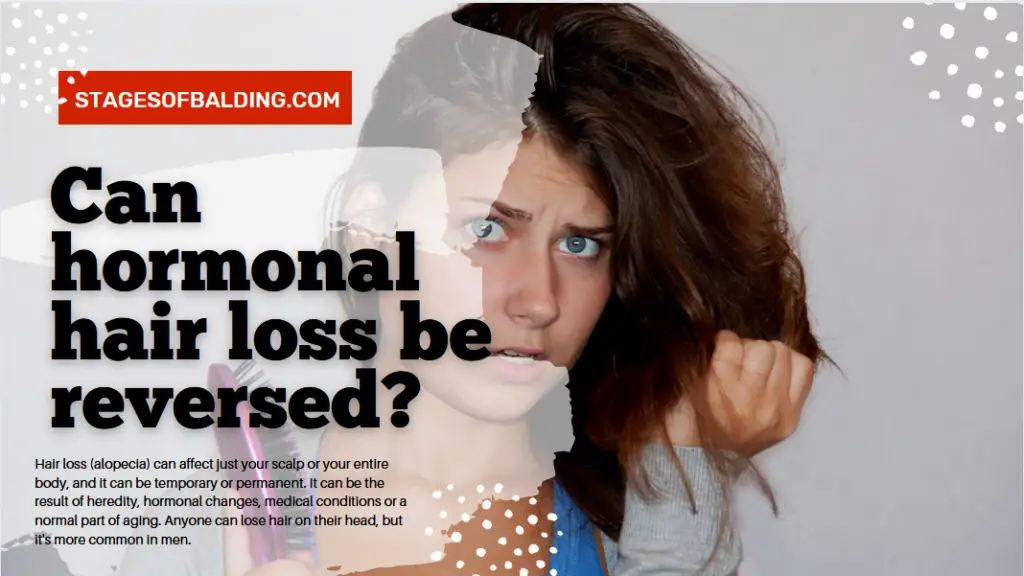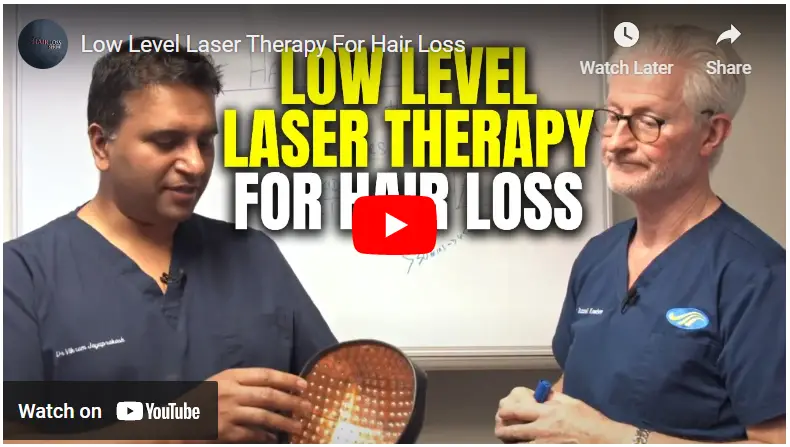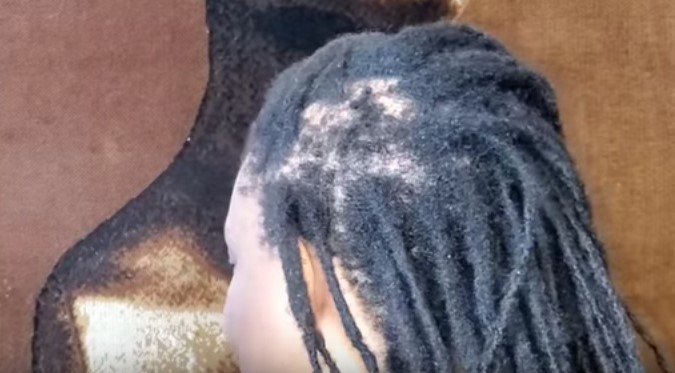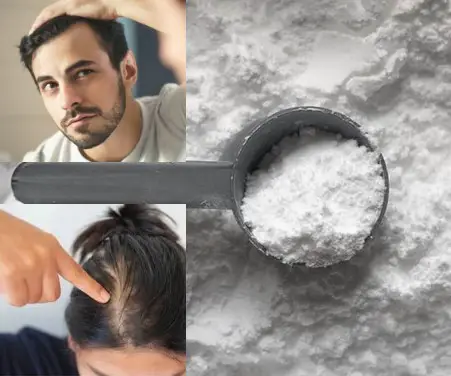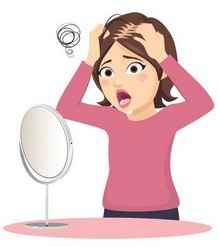Hormonal hair loss is a common problem that affects both men and women. It can be a distressing condition, but the good news is that it can be reversed with proper treatment. In this blog post, we’ll explore the answer to the question: Can hormonal hair loss be reversed? The short answer is yes – hormonal hair loss is reversible, but it requires proper diagnosis and treatment.
We’ll look at how hormones can cause hair loss, what treatments are available, and whether or not female hormonal hair loss is reversible naturally. We’ll also discuss how to prevent hair loss from happening in the first place.
Hormonal hair loss is the result of an imbalance in your body’s hormones. It can be caused by birth control pills, taking certain medications or even lifestyle changes that affect your endocrine system. Hormonal hair loss can range from mild to severe and may last for months or years. Luckily, there are ways to treat this condition if it has already begun affecting your appearance!
The science behind hormonal hair loss
Hormonal hair loss, also known as androgenetic alopecia, is the most common form of hair loss in both men and women. It occurs when a hormone called dihydrotestosterone (DHT) causes the follicles of the hair to become smaller and weaker, leading to thinning and, eventually, baldness. While it can affect both sexes, it is more common in men and usually starts with a receding hairline.
The cause of hormonal hair loss is complex and not fully understood. It is believed that genetics, hormones, and age all play a role. The male hormone testosterone is converted into DHT by an enzyme called 5-alpha reductase, and this DHT then attaches itself to receptors on the hair follicles. This attachment eventually leads to the follicles becoming smaller and weaker, which leads to thinning and, eventually, baldness.
Fortunately, there are treatment options for reversing hormonal hair loss. Treatments such as minoxidil, finasteride, laser therapy, and even dietary changes have all been proven to be effective in stopping or slowing down the progression of androgenetic alopecia. Additionally, hormones such as bioidentical hormones and hormone replacement therapy can also be used to treat hormonal hair loss. However, it is important to note that these treatments may not be able to reverse the process completely, but they can help stop further hair loss and may even help regrow some of the lost hair.
What is Hormonal Hair Loss?
Hormonal hair loss is a condition in which you lose hair due to the imbalance of hormones. In women, hormonal hair loss can be caused by menopause or pregnancy. In men, it may be caused by an illness like prostate cancer or testicular cancer.
Hormonal hair loss can also be caused by medications such as birth control pills that contain estrogen or other types of hormone replacement therapy (HRT). These treatments work by increasing the amount of estrogen circulating in your body and stimulating new growth at the follicle level – but they don’t solve the root cause of your problem.
How does it happen?
Hair loss is a common condition that can affect men and women of all ages. It occurs when the hair follicles grow out of balance with their environment, causing them to become thinner and less visible over time. This can occur for a number of reasons.
Hormones are chemicals produced by our bodies that regulate many functions, including growth, metabolism and fertility. When these hormones aren’t working well or are imbalanced in some way (for example, if you’re taking an illness medication), they may no longer be able to produce enough of the right kind of protein for new strands of hair to form on the surface of your scalp.
As this happens over time–for example, if you have seasonal allergies or stress–your entire body will start losing its ability to make healthy amounts of certain proteins necessary for growing new hairs as well as keeping existing ones strong and healthy looking.
If you’re experiencing hair loss due to hormones, it is important to visit your doctor to determine the underlying cause. Once the cause has been identified, it is possible to find the best treatment options for reversing your hormonal hair loss. Depending on the cause, treatments may include lifestyle changes, medication, hormone replacement therapy, and nutritional supplements.
While some cases of hormonal hair loss are reversible, others are permanent. It’s important to take steps to try and stop the further hair loss before trying to reverse what has already occurred.
What are the triggers that cause hormonal hair loss?
Hormonal hair loss is a condition that can be triggered by many factors, including:
- Excess stress
- Medications and supplements that affect hormone levels (like birth control pills)
- A diet high in refined sugars and processed foods
- An unhealthy lifestyle that puts too much strain on your body
Can hormonal hair loss be reversed?
Hormonal hair loss is reversible, and it can be treated with the right treatment. Hormonal hair loss is caused by a hormone imbalance that causes your body to produce excess levels of dihydrotestosterone (DHT). DHT is responsible for thinning hair, so if you have too much DHT in your system, it will make it difficult for your body to produce enough testosterone or estrogen.
The good news is that hormonal hair loss can be reversed with the right treatment! The first step toward reversing hormonal alopecia is identifying what’s causing this imbalance in the first place: Are you eating too many processed foods? Are you drinking coffee or soda on a regular basis? If so, then it’s important to incorporate more fruits and vegetables into your diet instead of sugary drinks or processed snacks like chips–these are loaded with artificial ingredients that can negatively affect hormones over time.
Does it have to be permanent?
Hormonal hair loss is a condition that can be reversed, prevented and improved. It’s a medical condition that affects many women and men. Hormonal hair loss happens when doctors prescribe hormone replacement therapy (HRT), which is used to treat menopause-related symptoms like hot flashes or night sweats. If you’re experiencing this kind of symptom, your doctor may recommend hormone replacement therapy in order for you to feel better again so they can avoid the symptoms altogether while they find out what causes these problems in the first place.
Can you reverse thinning hair?
As we all know by now, thinning hair is a common condition that affects millions of men and women. There are many ways to reverse thinning hair–and you can do so with diet and supplements as well as certain shampoos.
The first thing you should know about reversing thinning hair is that it’s not just a matter of changing your diet or taking supplements. You’ll also need to use different products on your scalp if you want them to work effectively in reversing thinning scalp issues like dandruff or dryness (which can occur when there isn’t enough oil flowing through our scalp).
Can menopause cause thinning hair on one side of your head?
The average age of menopause is 51 years old. Menopause is a natural process that happens to all women, but it can be triggered by certain health conditions or medications.
You may notice thinning hair on one side of your head during this time in your life. The cause could be hormonal changes related to the menstrual cycle, stress levels, hormone imbalances and even genetics (your father may have had thinning hair).
How long does hair thinning last after menopause?
How long does hair thinning last after menopause?
If you’re experiencing thinning, it’s important to know that the condition is temporary. Hair loss occurs when your body produces too much of a hormone called dihydrotestosterone (DHT). DHT causes your follicles to shrink and weaken, which ultimately leads to their shrinking or even falling out completely.
This process takes about 3-6 months from start to finish and occurs gradually over time as you age into old age. Your doctor may prescribe medication if they suspect that you’ve developed an underlying medical condition that could be causing thinning; otherwise, this condition will resolve on its own without intervention from anyone but yourself!
It is possible to reverse hormonal imbalance and stop thinning.
It is possible to reverse hormonal imbalance and stop thinning. Hormonal imbalances can cause thinning and receding hairlines, but they can be reversed with changes in diet, medication or supplements.
How do hormones affect hair?
Hormones are chemicals that regulate the body’s functions. They can play a role in hair growth, as well.
Hormone levels have an effect on both men and women, but women are more likely to experience thinning hair because of their menstrual cycle. When a woman goes through menopause (when she stops having periods), hormone levels drop significantly, which can lead to the reduced thickness or even bald spots if left unchecked for too long.
If you’re experiencing hormonal changes due to pregnancy or giving birth, you may notice some thinning at first–but this will often resolve itself once your body has adjusted back into normalcy again.
What can you do about it?
There are a few ways to reverse hair loss in women. The first is diet and exercise. Try to eat as healthy as possible while also getting enough sleep, exercising regularly and taking vitamins to help your body stay healthy.
You can also use supplements such as Procerin, which is a proprietary blend of amino acids that have been shown in clinical tests to stimulate the production of collagen by stimulating fibroblasts (cells) in the follicle where new growth occurs on the scalp; this helps slow down or even stop hair loss from progressing further.
How to get rid of thinning hair naturally.
Thinning hair is a common side effect of menopause, but it can also be caused by other medical conditions such as thyroid disorders and chronic fatigue syndrome. To prevent thinning hair, you should make sure that your diet is high in protein and healthy fats. Also, try to limit processed foods and eat more fruits, vegetables and whole grains, so your body gets all the nutrients it needs to produce healthy hair follicles again.
If you have already tried every natural treatment available without success, then you may want to consider looking into prescription treatments like Rogaine or Propecia, which help reduce inflammation in the scalp (known as dandruff) which can cause further thinning over time if left untreated by simply washing with regular shampoo daily instead!
Hormonal imbalances can cause thinning and receding hairlines, but they can be reversed with changes in diet, medication or supplements.
Hormonal imbalances can cause thinning and receding hairlines, but they can be reversed with changes in diet, medication or supplements.
Hormones regulate the way our bodies function. When you have a hormonal imbalance, your body’s levels of certain hormones are out of balance with what they should be for healthy growth. This causes a variety of problems, including:
- Hair loss (thinning)
- Scalp sensitivity (redness)
- Dandruff
What is hair loss?
Hair loss is the loss of hair from the scalp. It can be temporary or permanent, and it may be caused by a number of factors, including genetics, diet, and stress. If you are experiencing hair loss due to one of these causes (or if you want to prevent further thinning), it’s important that you speak with your doctor about treatment options — whether they include medication or surgery.
If you’re concerned about losing your hair over time–and don’t want to be left behind in this age of Insta-perfection–there are plenty of ways to support your current look while also fighting back against thinning strands:
What causes hair loss?
Hair loss can be caused by a number of different factors, including:
- Alopecia areata – an autoimmune disorder that causes patches of hair to fall out. It’s most common in women and typically affects the scalp.
- Anagen effluvium – a condition in which your body undergoes rapid changes as it transitions from one phase of growth (anagen) to another phase (telogen). This can happen when you’re under stress or have other health issues that affect your thyroid gland or adrenal glands, such as Addison’s disease or Cushing’s syndrome–which is why doctors treat this type of hair loss with steroids if it occurs after menopause.[1]
- Androgenetic alopecia – genetic mutations that cause follicles on your head to shrink over time, eventually leading them to fall out altogether.[2] As we age, there’s also an increased risk for this condition because our hormones change; however, there may be ways around these odds if you’ve been diagnosed with female pattern baldness.*
- Telogen effluvium – another form where sudden hormonal changes trigger shedding months before expected due to simply having more than one child (or even none at all!) If someone had never experienced this before but suddenly has two children, then chances are high they’ll lose their hair within six months after birth too![3]
Other – cause of balding.
When to see a doctor about medical causes of hair loss.
If you have been losing hair for more than 6 months, it’s worth seeing a doctor. A family history of hair loss may be an indication that there is a medical cause for your thinning. If so, you should discuss this with your doctor and see if they can recommend any tests or treatments that could help.
If your hair is thinning in clumps or patches and it affects the way you feel about yourself (i.e., self-esteem), then it might be time to visit the doctor too!
How hormone imbalances can cause hair loss
Hormone imbalance is a common cause of hair loss. While there are many different types of hormone imbalances, they all share one thing in common: they cause your body to stop producing enough of the hormones that regulate your hair growth.
Hormones can be affected by medications, diet and lifestyle changes, as well as stress levels–all factors that can lead to a decrease in the number of sex hormones (testosterone) produced by your body. When this happens over time, it’s called “poor testosterone production.” Low levels of male sex hormones are also linked with increased risk for conditions like prostate cancer and gynecomastia (breast enlargement).
Hormonal imbalance caused by medications
Some medications can cause hormonal imbalances, which can lead to hair loss. There are also some medications that act as estrogen-like drugs and cause menopause hair loss.
Hormonal imbalance is caused by diet
- High sugar diet
- High salt diet
- High protein diet
- Low protein diet
- Low-fat, carbohydrate and fiber diets can also cause hormonal imbalance in the body, but they are less likely to do so than any of the other dietary factors mentioned above.
Hormonal imbalance is caused by exercise/lifestyle changes
Hormonal imbalance can be caused by exercise, diet and lifestyle changes. Exercise is known to cause hormonal imbalance in the body because it increases stress levels in the body and fatigue levels too. This leads to an increase in cortisol production which leads to excess weight gain or weight loss depending on your genetics and other factors like age and gender. The diet also plays a role in causing hormonal imbalance as well as stress levels which may lead to emotional eating habits due to a lack of patience with yourself or others around you.
Stress triggers cortisol secretion from the adrenal glands (small glands located above each kidney) when we experience physical or mental stressors like deadlines at work; family problems; arguments with friends/family members; feeling overwhelmed by responsibilities at home/school, etcetera.
Symptoms of hormone imbalance related to balding.
Hair loss is a common side effect of both menopause and puberty, but it can also be caused by other conditions. If you’re experiencing any of these symptoms, it’s important to see your doctor:
- Thinning hair
- Bald spots on the scalp or body (also known as alopecia)
- Scalp itching that doesn’t seem to go away no matter what you do (this is called dandruff)
Treatments for hormonal imbalance related to balding
Hormone replacement therapy is a treatment that involves the use of hormones to help balance your body’s hormones and increase your hair growth. This can help with both male and female pattern baldness, as well as other types of hair loss.
Biotin supplements are also used to treat hormonal imbalances related to balding and stimulate new follicles. Vitamin D3 may be helpful for female pattern hair loss (FPHL) by preventing the death of existing scalp cells, which can lead to thinning or alopecia. Vitamins A, B6, B12 and folic acid may help prevent FPHL in women by increasing the production of testosterone levels among menopausal women who are experiencing FPHL symptoms such as thinning or falling out; however, these supplements aren’t recommended during pregnancy because they may lead to congenital disabilities including neural tube defects such as spina bifida if taken during pregnancy.
There are many causes of hair loss, but there are also treatments that can make your hair grow back stronger, better and faster than ever before!
Hair loss is a common problem that affects many people. It can be caused by many different things, including medication side effects, diet and lifestyle changes, genetics and stress.
Hair loss is reversible if you take steps to treat the underlying cause of your hair loss. Some of these treatments include:
- Hormone imbalance (sometimes called hypogonadism) – This condition occurs when there are too few or too many hormones produced by your pituitary gland (which controls all other glands in your body). The most common hormone imbalance causing female pattern hair loss is due to low levels of estrogen or testosterone; however, some men also experience this condition because they have too little or too much testosterone in their bodies.*
- Medication side effects – This happens when you take medications without consulting with a doctor first, so make sure that before taking any new prescription drugs make sure that it’s okay for them not only physically but also mentally/emotionally because sometimes these medicines might have some adverse effects on us especially if we don’t take them properly which means doing research beforehand before taking anything else such as alcohol drinks etcetera.*
- Dieting – It’s important not just how much calorie intake but also how often I eat throughout my day. How often do I exercise? What type(s) food should I eat, depending on what types of activity (ies), e.g. If I’m exercising regularly, then maybe eating more protein-rich foods would help me gain muscle mass faster than someone who doesn’t workout regularly would need fewer calories per pound and lose weight due solely because they have been eating more carbohydrates instead, which means feeling fuller longer between meals until eventually reaching goal weight faster than ever before!
How can I restore my hormonal hair loss?
Use good DHT blocker shampoo and a good conditioner. Refrain from overloading on products that claim to reverse hair loss–it’s tempting, but you want to save your hair and scalp by using fewer products at once. Instead, focus on using one or two effective ones that are specifically designed for this purpose (like Rogaine Foam). If you’re looking for something else that may help with the look of thinning hair, consider rotating through different shampoos and conditioners so that you’re always giving your strands time to recover from each treatment before applying another one!
How long does it take for hormonal hair loss to grow back?
Hormonal hair loss can be reversed, but it takes time. If you’ve noticed thinning hair in your upper lip and chin area in the past few months, then chances are high that hormonal imbalance is behind the problem. However, if you’ve been experiencing thinning all over your head for years now and are still looking for a solution to this problem, then there may be something else going on in addition to hormones and diet changes–like stress or illness–that could also contribute to this condition.
There are many ways to reverse thinning hair after menopause:
- Switching from shampoos with sodium lauryl sulfate (SLS) or sodium lauryl ether sulfate (SLES) to shampoo without these ingredients can help reduce inflammation caused by SLSs while preserving moisture levels in your scalp so that new growth can thrive instead of being damaged by dryness caused by chemicals like SLSs.*
- Using herbal remedies such as shampoos made with peppermint oil can provide relief from itching associated with growing pains.*
- Eating foods rich in vitamin B3, like bananas, will help encourage faster recovery times after using herbs or supplements such as minoxidil topical creams used topically — they contain ingredients such as acetyl l-carnitine which helps kick start production within cells when applied directly onto the scalp tissue surfaces.
How do I activate my hair growth hormones?
You can activate your hair growth hormones by following these steps:
- Eat a healthy diet: A balanced diet full of fresh vegetables, fruits and whole grains is best for hormone production. You should also limit your intake of saturated fats and trans-fats found in processed foods like fast food and sugary treats.
- Exercise regularly: Regular exercise improves blood circulation, which helps to increase the production of testosterone in men as well as estrogen in women (the female sex hormone responsible for increased hair growth). It also provides endorphins which promote relaxation so that you’re less likely to stress out about things like having thinning hair!
- Get enough sleep each night: this is especially important if you have insomnia or wake up feeling exhausted every day after waking up too early in the morning before work/school etc. It might feel impossible at first but keep trying until eventually, and it becomes easier, so try not to give up on yourself too soon 🙂 Some people find that reading articles online helps them fall asleep better than watching TV shows; either way, make sure there aren’t any loud noises from outside because this could cause nightmares later on down the line when trying hard enough to get back into shape again!
Conclusion
Finally, it is important to remember that reversing hormonal hair loss is not always possible. Depending on how long the hair loss has been going on, it may not be possible to restore the hair to its previous state fully. However, with the right treatments and lifestyle changes, it is possible to stop further hair loss and regrow some of the lost hair.
Hormonal hair loss is a complex and often the silent problem that can cause severe embarrassment, stress and anxiety. It affects millions of people worldwide. The good news is that there are many ways to reverse the effects of this problem and restore your confidence in yourself again!
- AI Powered Bald Filter Online 2024: See Yourself with No Hair! - January 19, 2024
- Harklinikken Bad Reviews 2024: Analyzing Negative Feedbacks - January 18, 2024
- How to Get the Alex Eubank Hair | Step-By-Step Tutorial 2024 - January 18, 2024

